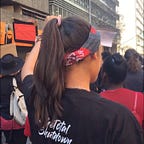How Isolation Impacts Identity
As human beings, we define ourselves based on our connections and relations with other people. Aristotle famously said, ‘“Man is by nature a social animal; an individual who is unsocial naturally and not accidentally is either beneath our notice or more than human.” Now, we all find ourselves in social isolation. This mandatory quarantine brings new experiences and frightening thoughts. During this uncertain time when many are confined to their houses, people will be finding their identities and daily lives undergoing change. Identity is usually defined socially, but when standing alone without any of their usual contexts, humans find themselves vulnerable, stripped of their comforting props. Under the present conditions of isolation, people are likely to find their sense of themselves shifting in ways which can be painful, yet which might also have positive elements; the ways in which we approach this problem will play a part helping or hindering these transformations of identity. Everything about life is changing for people all across the world, from India to South Africa.
Isolation can mean family roles are changing as individual members within a family need to take on a lot, being without usual contexts and external help, or perhaps becoming more regressive. Drawing on my own family as a personal example, my mother, a 47-year-old full-time working woman, believes her ‘identity as a carer is quite central now’ as she must ‘look after the house, family, dog and children’. This adds new pressure and puts more emphasis on her role as a mother and wife as in addition to a worker. She stresses the concern that this is ‘unpaid care work’ and she has added responsibility due to the regular domestic carers, such as cleaners, who are now unable to come. My mother’s priorities are shifting, meaning who she is as a person is changing. Many working mothers are feeling their identities are changing in isolation as they are forced to take on more tasks at home, especially with the added pressure of their children being home 24/7, while still juggling their jobs.
As a GCSE student in the United Kingdom, I feel my identity and life has greatly changed. My exams were cancelled. Everything I was working for in the past two years has disappeared. Everything I was looking forward to has been taken away. Everything about my day-to-day life is different. I used to walk to school with my friends. Then, go to all my classes and eat lunch in the canteen. After this, I would walk home again, do some homework, watch TV and start the whole day again the next day. I found myself basing my identity on what my favourite classes were, who my friends were and what choices and actions I made throughout my day. Now, without these comfortable contexts and sense of routine, I feel as if the legs are being taken away from under me. My makeup is being wiped off my face and I am left with a bare, stripped-down, new identity. Aristotle said, ‘We are what we repeatedly do.’ Without my routine and repetition, who am I?
